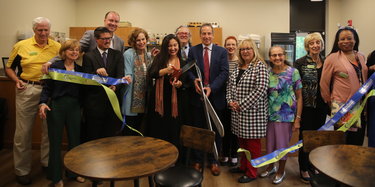GPL trustees hire NYC firm Guidepost to investigate charges of racism leveled by Café con Mel
GUILDERLAND — The trustees of the Guilderland Public Library discussed at length four applicants to investigate allegations of racism and harassment leveled by the owner of a now-closed library café and settled on Guidepost Solutions.
According to its website, the firm has offices in Bogotá, Chicago, Dallas, Honolulu, London, Los Angeles, Miami, New York, Palm Beach, Phoenix, Sacramento, San Francisco, Seattle, Singapore, Walnut Creek, and Washington, D.C.
“Our goal is to help you seize opportunities on the horizon, minimize disruption, or move on from difficulty,” the firm says on its website.
The Enterprise requested copies of the proposals from the four applicants discussed by the trustees at their March 21 meeting but was told by the library’s interim director, Nate Heyer, they wouldn’t be available even through a Freedom of Information Law request, because, he claimed, they were protected by attorney-client privilege.
Later, in his role as the library’s records access officer, Heyer responded to the Enterprise’s March 24 FOIL request for the four proposals, stating that it would take 20 business days to “compile and review the records.”
Heyer emailed the four proposals — from Guidepost; Public Sector HR Consultants; Capezza Hill; and Bond, Schoeneck & King — to The Enterprise on March 29. The rates and fees, including for Guidepost on which public funds will be spent, had been blacked out.
Heyer cited privacy concerns in explaining the redactions. Kristin O’Neill, the assistant director of the state’s Committee on Open Government told The Enterprise, “When dealing with a government entity, how much you’re making from the government cannot be a secret.”
The Enterprise is appealing the denial to the library’s assistant director, Natalie Hurteau.
“How much would we want to spend on this?” asked the board’s president, Catherine Barber, at the board's March 21 meeting, noting the costs were in the neighborhood of $16,000.
“That’s a lot to investigate a Facebook post,” said Barber.
Barber had been out of town on vacation when the café, owned by Melanie Diaz Partak and Joy Mercado Anderson, closed on Feb. 21, with no warning. It had been open for less than six months and was a first for the library.
“I have faced racism, harassment and constant disrespect,” said the Feb. 21 post on the Café con Mel Facebook page. “These issues have not only come from patrons, which I am no stranger to dealing with, but they have come worse surprisingly from the Library staff members.”
About 75 people flocked to the public library on Feb. 26 looking for the truth. The trustees, after listening to those comments, voted at their Feb. 28 meeting, to hire an outside party to investigate the allegations raised by the Café Con Mel “to remove all bias” as the board’s vice president, Elish Melchiade, put it.
Melchiade ran both meetings in Barber’s absence and on March 21 she left the meeting room as the trustees discussed hiring investigators because, Melchiade said, she had been told by the board’s lawyer that she would be part of the investigation.
Responding to Barber’s comment about spending $16,000 to investigate a Facebook post trustee Norina Melita said of the public reaction, “They really want to know what went on.”
“I wasn’t there,” said Barber.
“I was there for all of it,” said trustee Corie Dugas. “It needs to be done.”
Trustee Michael Hawrylchak at first suggested eliminating the two applicants that would have travel costs.
Melita objected because her first choice was Guidepost.
Dugas said it could be better to have someone who is not local investigating because they would be “completely disengaged.”
Trustee Barbara Fraterrigo at first strongly supported a local lawyer who had applied.
Dugas said she preferred a human-resources firm but others including Melita and trustee Marcia Alazraki — both lawyers themselves — thought a lawyer was important.
“There may still be litigation … with a legal focus, they will look at what we’ve been doing wrong … we know she might sue,” said Melita of the café’s owner.
The trustees ultimately agreed on Guidepost as its staff included both human-resources professionals and lawyers.
In the course of the discussion, it became clear that other applicants had not wanted all of what they investigated publicly shared.
After deciding on Guidepost, the board then discussed how to go about hiring the agency — through the board or through the board’s attorney, Erin Rose Morris with Girven Ferlazzo.
Hawrylchak said that, during the board’s meeting after the public-comment session, the trustees and the attorney were not seeing eye to eye, which he said, “makes me hesitant to go through the attorney.”
Fraterrigo said that Morris had told the trustees before someone is hired, the board has to decide if it wants everything from the investigation or a summary report.
“Part of the whole purpose of this is to produce something public,” said Hawrylchak.
Melita said the board will have the final say on what is released and the report will be protected by attorney-client privilege.
Barber, also an attorney herself, volunteered, “I could have contact with the attorney.”
Melita suggested the board review the contract with Guidepost at a special April meeting that is being scheduled to discuss next year’s library budget.
The board voted again on Guidepost to make “crystal clear” as Hawrylchak put it, that the board’s attorney was authorized to enter into a contract with Guidepost.
Separate investigation
At its Feb. 28 meeting, the trustees had agreed to hire an outside firm to investigate the charges made by Café con Mel but then to discuss separately how to investigate the library’s role, including such questions as how the Café con Mel was hired, the terms of the contract including the rent of $200 per month, and work done for the café.
Trustees frequently referenced a Freedom of Information Law request, noting that the library was already amassing documents to answer that request.
The Enterprise had filed a FOIL request on Feb. 26 for any and all documents related to the Café con Mel and its owners, including but not limited to contracts or complaints.
Initially, the library responded it would take 20 business days to answer the request. But on March 22, Heyer, who had been named public information officer at the board’s Feb. 28 meeting, informed The Enterprise it would be another 20 business days to assemble the documents, to be expected no later than April 22.
Trustee William Cooney said of the document search, “It’s voluminous and it doesn’t answer all the questions.”
“This has been incredibly labor intensive and we have to run a library,” said Heyer of gathering the documents. He said he’d appreciate it if board members could do their own digging.
Melita suggested the board’s attorney should do the investigation.
Hawrylchak responded there were questions about the legal advice the board was given on the contract.
“Isn’t this our responsibility?” asked Fraterrigo.
Barber noted a design committee had made financial decisions up to a certain level as the library was being upgraded and expanded.
Trustee Antonio Rivera said there had also been a café committee, which he had served on, and that committee had authorized purchase of restaurant equipment.
Melita questioned whether a board committee would work since the trustees had all been involved in the process.
“I think we need to know our mistakes,” insisted Rivera, so that they are not repeated, he said.
Hawrylchak suggested putting together a committee to review the documents and then deciding if outside counsel is needed.
He volunteered to be on the committee — and so did Alazraki, Cooney, and Fraterrigo.
All eight members present for the meeting voted in favor of that plan.
Gup resigns
The last item in open session was to accept the resignation of trustee Ted Gup. He was elected to the board in 2022 and his term would have ended in 2027.
Fraterrigo alone voted against the motion.
“I’m really saddened he’s chosen this route,” she said, praising Gup’s mindset as a journalist who “asked tough questions,” which some people didn’t like, she said, and who valued transparency.
Barber noted that both of her children are journalists and said, “It’s the nature of journalists not to accept the status quo … It’s disappointing he determined he wanted to resign.”
Reached by The Enterprise this week, Gup had this to say about the reasons for his resignation: “I found that I was uncomfortable with the way the board functioned and the decisions it made. I have been a lifelong advocate of transparency and accountability and found that those two issues were a source of friction between myself and some of the other members of the board.
One of Gup’s books is titled “Nation of Secrets: The Threat to Democracy and the American Way of Life.”
“Ultimately," Gup said, "I concluded that I could not make a meaningful contribution to the board and felt that my presence was seen by some as an unwelcome distraction.”
The Enterprise filed a Freedom of Information Law request on March 25 and received Gup’s letter of resignation the next day from Heyer. The letter is posted online in its entirety with this story.
“My background and values, the very things that I had hoped would prove to be an asset to the board, have proven to be a liability and source of continuing conflict,” Gup wrote. “I have felt the pressure to resign, expressed both subtly and directly, by several influential members of the board, even as others urged me to stay on.”
Gup went on to say that his values had diverged from board practice in a number of matters.
“They include breakdowns in communication between the library and the board, within the board, and between the board and public,” he wrote. “They involve the awarding of contracts, the vetting of prospective contractors, the willingness to robustly investigate those matters, and a number of other unrelated areas. Broadly speaking, they go to core issues of governance, management and accountability.”
Gup also cited “times when concerns for the institution’s image and good name have superseded concern for the values that support and warrant the public’s trust, in short, that messaging has trumped substance” and concluded, “Democracy is a contact sport, reasonable minds may differ, and I have no delusions that I am in exclusive possession of what is right. I know all too well my many fallibilities. Still, a person must have some confidence in their own moral compass and steer by it.”



